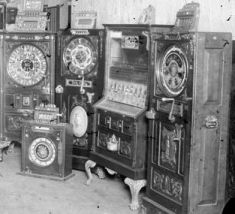|
During the 1903 Iroquois Theater fire in Chicago, fifty year old
Helen Trask was found unconscious inside
the Iroquois Theater, reportedly having jumped or
been pushed from the second floor balcony to the
ground floor.▼1 Most victims carried out the front door of the theater who showed signs of life were taken to
Thompson's Dinner
next to the theater; those found in Couch Place were sometimes carried to nearby drugstores and taverns.
Firemen carried Helen's body around
the corner to Louis Witz's saloon, a basement level saloon below a cigar store at 91-95 Randolph, on the
northwest corner of Randolph and Dearborn. A physician was summoned.▼2
The doctor struggled to revive Helen, directing two saloon waiters — Charles
H. McCarthy and Thomas J. Conway — on how to move
her arms in hopes of further stimulating breathing,
while the physician massaged her heart. To
eliminate breathing restrictions they opened the
fitted bodice of her dress (in 1903 called the
"corsage") where one of the saloon waiters saw a
small chamois bag pinned to her dress. When
the physician wasn't looking, he pocketed the
chamois bag.
When it became clear Helen could not be resuscitated,
the doctor thanked the waiters for their efforts and
left the saloon. With the doctor out of the
picture, the waiter turned over the chamois bag to
his boss, Louis Witz, and they examined the
contents, finding $210 in
currency ($5,500 today).
When Helen's body was picked up
from the saloon for transport to the
morgue, saloon owner Louis Witz turned over to
police only a portion of the money found on
her body, just $11 ($280 today),
as well as a gold neck pendant
watch, claiming it was all there had been.
The theft from Helen Trask's dead body became the only verified and prosecuted case of valuables stolen from an Iroquois Theater victim.
|
|
|
A large amount of cash
Helen was carrying what seems a crazy amount of money but
there weren't checking accounts or credit cards
then. Whatever moneys might be needed had to
be carried. Such an amount suggests that Helen
left home prepared to purchase some pricey items.
Jewelry or silver tea sets wouldn't have been on her
shopping list because her husband sold those at his
shop in Ottawa. Marshall Field and Carson
Pirie Scott were among stores near the theater that
offered selections of fashions, furs, carpets,
furniture and china more varied than what she could
have found in Ottawa, all shippable to her home.
Daughter raised alarm
When Helen's daughter, twenty-five year old
Julia E. Trask, heard how few dollars were
recovered from her mother's body, she contacted police to report that her
mother had been carrying far more.
Helen had left home with $325 ($8,500 today),
of which $75 ($1,960 today) had belonged to Helen and $250
($6,550 today) to Julia.
At trial Julia enumerated Helen's expenditures as totaling approximately $115 ($3,012 today)
on shopping for herself and Helen, and a hotel bill, leaving around $210 ($5,500) that
should have been in Helen's possession when her body was found.
Slam dunk
Witz lived at 521 Paulina Street, Conway
at 153 South Sangamon and McCarthy
at 3219 Archer. All three were arrested
by police sergeant Moran Collins, questioned by
police captain Patrick J. Gibbons
and confessed to the crime. There were
trumpets blaring in the background of newspaper
stories about the confessions but they may not have
been the result of extraordinary police work.
Helen Trask had been at the theater with the
daughter of Maurice Mohoney, former attorney general
for the state of Illinois — a nice piece of
leverage. Then too was that Louis Witz spent
nearly half his "haul" on hush money, not a sign of
a toughened hustler.
Hush now
Witz said his employees had given
him the money but that
they then demanded money to keep silent.
He first gave McCarthy
$10 ($260) but McCarthy came back for
more and received $15
($390) then $2.50 ($65). The
other employee, Conway, was given
$5 ($130) and $15 ($390) and a
stranger from St. Louis who claimed awareness of the
theft received $25 ($650).
|
 |
Indictments
On January 19, 1904 a grand jury indicted
the trio and Chicago mayor Harrison cancelled Witz's
saloon license. The men were
arraigned before judge
John R.
Caverly in the Harrison street
police court. Their interim
attorney, George S. Foster (1865–1946),▼3
argued that another ten days was needed
to plan their defense. The judge gave them three
more days and set bail at $5,000 each. Unable
to raise bail, they spent the
three days in jail.
Defense
The case was tried in the
court of judge Joseph Gary (the same judge who tried
another Iroquois ghoul case, that of
Harry Klawans), prosecuted by assistant states
attorney Fred Lewis Fake (1868–1939) — who would go
on to become a municipal judge — and criminal
defense counsel, Joseph R. Burres (1858–1918).
Burres had a long history of gaining acquittals and
lesser sentences for an Chicagoans accused of
violent crimes. Since the accused had not had
bail, it seems possible Burres took the case for the
publicity.
He argued that the defendants could not be
charged with grand larceny because the money Helen
carried was jointly owned with Julia and
that since it could not be proved Helen was alive at
the time she was robbed, the money
was part of her estate.
Witz was found guilty on February 3, 1904. The verdicts for McCarthy
and Conway were not reported, nor was Witz's
sentence.
~~~~~~~~~~~~~~~
The Trask theft wasn't Witz's first brush with the law.
In January, 1903 he had been among one hundred thirty five Chicago saloon
and cigar store retailers indicted for operating
illegal gaming devices in the form of nickel cigar
slot machines.

|
